Thailand, often referred to as the “Land of Smiles,” is a Southeast Asian gem renowned for its vibrant culture, stunning landscapes, and rich history. This fascinating country offers a unique blend of ancient traditions and modern allure, making it a must-visit destination for travelers from around the globe.
Table of Contents
Geography
Thailand is located in the heart of Southeast Asia, bordered by Myanmar to the northwest, Laos to the northeast, Cambodia to the southeast, and Malaysia to the south. It covers an area of approximately 513,120 square kilometers, making it the 50th largest country in the world.
The geography of Thailand is diverse, ranging from mountainous regions in the north to fertile plains in the central region, and pristine beaches along the southern coastlines. The country’s capital, Bangkok, is situated in the central part of Thailand and serves as the political, economic, and cultural hub of the nation.
States of Thailand
Thailand is divided into 77 provinces, known as “changwat” in Thai. These provinces are further grouped into regions: Central, Northern, Northeastern, Eastern, and Southern Thailand. Each province has its own unique attractions and cultural heritage, contributing to the country’s rich diversity and vibrant tourism scene. The capital city, Bangkok, holds a special status as both a province and the capital city.
| No. | Province | Famous Cities/Attractions |
|---|---|---|
| 1 | Abhakorn | Abhakorn |
| 2 | Amnat Charoen | Amnat Charoen |
| 3 | Ang Thong | Ang Thong, Wiset Chai Chan, Sam Ko |
| 4 | Bangkok | Bangkok, Thonburi, Chatuchak |
| 5 | Buriram | Buriram, Nang Rong, Phanom Rung |
| 6 | Chachoengsao | Chachoengsao, Phanom Sarakham, Ban Pho |
| 7 | Chai Nat | Chai Nat, Mueang Chai Nat, Noen Kham |
| 8 | Chaiyaphum | Chaiyaphum, Thep Sathit, Phakdi Chumphon |
| 9 | Chanthaburi | Chanthaburi, Laem Sing, Khao Khitchakut |
| 10 | Chiang Mai | Chiang Mai, Pai, Doi Suthep |
| 11 | Chiang Rai | Chiang Rai, Mae Fah Luang, Golden Triangle |
| 12 | Chonburi | Pattaya, Sattahip, Bang Saen |
| 13 | Chumphon | Chumphon, Thung Wua Laen, Sairee Beach |
| 14 | Kalasin | Kalasin, Kamalasai, Yang Talat |
| 15 | Kamphaeng Phet | Kamphaeng Phet, Khiri Mat, Khlong Lan |
| 16 | Kanchanaburi | Kanchanaburi, Erawan National Park, River Kwai |
| 17 | Khon Kaen | Khon Kaen, Khon Kaen Zoo, Wat Nong Wang |
| 18 | Krabi | Krabi, Ao Nang, Railay Beach |
| 19 | Lampang | Lampang, Wat Phra That Lampang Luang |
| 20 | Lamphun | Lamphun, Wat Phra That Haripunchai |
| 21 | Loei | Loei, Phu Kradueng, Chiang Khan |
| 22 | Lopburi | Lopburi, Phra Prang Sam Yod, Wat Phra Si |
| 23 | Mae Hong Son | Mae Hong Son, Pai, Soppong |
| 24 | Mukdahan | Mukdahan, Nakhon Mukdahan, Don Daeng |
| 25 | Nakhon Nayok | Nakhon Nayok, Khao Yai, Khao Khieo |
| 26 | Nakhon Pathom | Nakhon Pathom, Phra Pathom Chedi, Don Wai |
| 27 | Nakhon Ratchasima | Nakhon Ratchasima, Khao Yai National Park, Phimai |
| 28 | Nakhon Sawan | Nakhon Sawan, Wat Khukhak, Khao Ngu |
| 29 | Narathiwat | Narathiwat, Sungai Kolok, Waeng |
| 30 | Nonthaburi | Nonthaburi, Pak Kret, Ko Kret |
| 31 | Pathum Thani | Pathum Thani, Rangsit, Klong Luang |
| 32 | Pattani | Pattani, Yaring, Nong Chik |
| 33 | Phang Nga | Phang Nga, Khao Lak, Phang Nga Bay |
| 34 | Phatthalung | Phatthalung, Songkhla Lake, Wat Wang |
| 35 | Phetchaburi | Phetchaburi, Hua Hin, Khao Luang |
| 36 | Phetchabun | Phetchabun, Phu Hin Rong Kla, Wat Pha Sorn Kaew |
| 37 | Phitsanulok | Phitsanulok, Wat Phra Si Rattana Mahathat |
| 38 | Phrae | Phrae, Wat Phra That Cho Hae, Bo Kluea |
| 39 | Phuket | Phuket, Patong Beach, Phi Phi Islands |
| 40 | Prachinburi | Prachinburi, Khao Yai National Park |
| 41 | Prachuap Khiri Khan | Hua Hin, Prachuap Khiri Khan, Khao Sam Roi Yot |
| 42 | Ranong | Ranong, Koh Phayam, Raksawarin Hot Spring |
| 43 | Rayong | Rayong, Koh Samet, Ban Phe |
| 44 | Ratchaburi | Ratchaburi, Damnoen Saduak, Khao Ngu Stone Park |
| 45 | Rayong | Rayong, Koh Samet, Ban Phe |
| 46 | Sakon Nakhon | Sakon Nakhon, Phu Phan National Park |
| 47 | Samut Prakan | Samut Prakan, Bang Pu, Erawan Museum |
| 48 | Samut Sakhon | Samut Sakhon, Mahachai, Don Hoi Lot |
| 49 | Satun | Satun, Koh Lipe, Tarutao National Park |
| 50 | Si Sa Ket | Si Sa Ket, Wat Tha Sung, Phu Chi Fa |
| 51 | Sing Buri | Sing Buri, Wat Phra Non, Buri Ram |
| 52 | Surat Thani | Surat Thani, Koh Samui, Koh Phangan |
| 53 | Surin | Surin, Elephant Village, Phanom Rung |
| 54 | Tak | Tak, Umphang, Mae Sot |
| 55 | Trang | Trang, Koh Mook, Hat Yao |
| 56 | Trat | Trat, Koh Chang, Koh Kood |
| 57 | Ubon Ratchathani | Ubon Ratchathani, Pha Taem National Park |
| 58 | Udon Thani | Udon Thani, Ban Chiang, Phu Foilom |
| 59 | Yasothon | Yasothon, Wat Thung Si Mueang, Ban Pak |
| 60 | Phatthalung | Phatthalung, Songkhla Lake, Wat Wang |
| 61 | Nakhon Ratchasima | Nakhon Ratchasima, Khao Yai National Park, Phimai |
| 62 | Nakhon Nayok | Nakhon Nayok, Khao Yai, Khao Khieo |
| 63 | Ratchaburi | Ratchaburi, Damnoen Saduak, Khao Ngu Stone Park |
| 64 | Samut Sakhon | Samut Sakhon, Mahachai, Don Hoi Lot |
| 65 | Sukhothai | Sukhothai, Historical Park, Si Satchanalai |
| 66 | Surin | Surin, Elephant Village, Phanom Rung |
| 67 | Tak | Tak, Umphang, Mae Sot |
| 68 | Trang | Trang, Koh Mook, Hat Yao |
| 69 | Ubon Ratchathani | Ubon Ratchathani, Pha Taem National Park |
| 70 | Udon Thani | Udon Thani, Ban Chiang, Phu Foilom |
| 71 | Kamphaeng Phet | Kamphaeng Phet, Khiri Mat, Khlong Lan |
| 72 | Kanchanaburi | Kanchanaburi, Erawan National Park, River Kwai |
| 73 | Krabi | Krabi, Ao Nang, Railay Beach |
| 74 | Phang Nga | Phang Nga, Khao Lak, Phang Nga Bay |
| 75 | Phatthalung | Phatthalung, Songkhla Lake, Wat Wang |
| 76 | Udon Thani | Udon Thani, Ban Chiang, Phu Foilom |
A Glimpse into Thailand’s History
Thailand’s history is a tapestry woven with tales of ancient kingdoms, colonization, and resilience. The country’s name in Thai, “Prathet Thai,” means “Land of the Free,” a fitting title as it is the only Southeast Asian nation never to have been colonized by a European power.
The history of Thailand can be traced back to the Sukhothai Kingdom, which emerged in the 13th century. This was followed by the Ayutthaya Kingdom, known for its wealth and architectural grandeur. In the 18th century, the Chakri dynasty was established, leading to the formation of modern Thailand.
The Cultural Heritage of Thailand
Thailand’s rich cultural heritage is evident in its traditions, festivals, and daily life. The predominant religion is Theravada Buddhism, which influences many aspects of Thai culture, including its art, architecture, and festivals. One of the most significant festivals is Songkran, the Thai New Year, celebrated with water fights and religious ceremonies. Loy Krathong, another important festival, involves floating decorative baskets on rivers to pay respect to the water spirits.
Thai cuisine is another integral part of the cultural heritage, known for its balance of sweet, sour, salty, and spicy flavors. Dishes like Pad Thai, Tom Yum Goong (spicy shrimp soup), and Som Tum (green papaya salad) are beloved worldwide. Thai cooking emphasizes fresh ingredients, aromatic herbs, and a perfect harmony of flavors.
Bangkok: The Vibrant Heartbeat of Thailand
Bangkok, Thailand’s bustling capital, is a city that never sleeps. Known for its vibrant street life, ornate temples, and bustling markets, Bangkok is a blend of the old and the new. The Grand Palace, a complex of buildings at the heart of the city, is a must-visit. This historic site has been the official residence of the Kings of Siam since 1782 and houses the revered Emerald Buddha.
The city’s many markets, such as Chatuchak Weekend Market and Damnoen Saduak Floating Market, offer a sensory overload of sights, sounds, and smells. From street food stalls to high-end dining, Bangkok’s culinary scene is diverse and exciting. The city’s nightlife is equally dynamic, with rooftop bars, nightclubs, and cultural performances offering endless entertainment.
Northern Thailand: Mountains, Temples, and Tribes
Northern Thailand, with its cooler climate and mountainous terrain, offers a different pace compared to the bustling capital. Chiang Mai, the largest city in the north, is known for its well-preserved old city and numerous temples, including the iconic Wat Phra That Doi Suthep. This temple, perched on a mountain overlooking the city, offers stunning views and a glimpse into the region’s spiritual heritage.
The north is also home to various hill tribes, each with its unique customs and traditions. Visiting these tribes provides insight into the diverse ethnic tapestry of Thailand. The region is also known for its adventurous activities such as trekking, zip-lining, and exploring caves.
Southern Thailand: Beaches and Islands
Southern Thailand is renowned for its stunning beaches and idyllic islands. The Andaman Sea and the Gulf of Thailand coastlines boast some of the world’s most beautiful beaches. Phuket, Thailand’s largest island, is a popular destination known for its vibrant nightlife, luxury resorts, and beautiful beaches like Patong, Kata, and Karon.
Krabi province, with its dramatic limestone cliffs, clear waters, and islands like Phi Phi and Railay Beach, is a paradise for rock climbers and beach lovers. The Similan Islands, a national park in the Andaman Sea, offer some of the best diving spots in the world, with vibrant coral reefs and diverse marine life.
Top Ten Must-Visit Destinations in Thailand
1. Bangkok
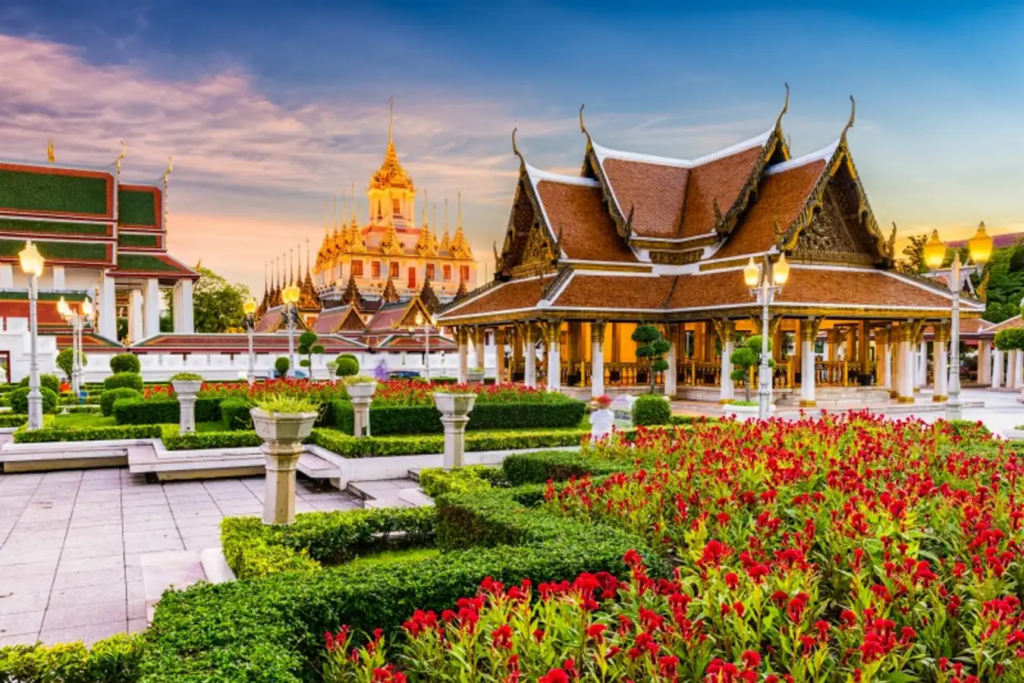
Bangkok, the bustling capital city of Thailand, is a vibrant metropolis that seamlessly blends the old and the new. Known for its ornate temples, bustling markets, and dynamic nightlife, Bangkok offers a plethora of attractions. The Grand Palace, home to the revered Emerald Buddha, is a must-see, while Wat Pho’s giant reclining Buddha is equally impressive.
The city’s markets, like Chatuchak Weekend Market and Damnoen Saduak Floating Market, are perfect for shopping and sampling local street food. Don’t miss the vibrant nightlife on Khao San Road and the stunning views from rooftop bars.
2. Chiang Mai

Chiang Mai, nestled in the mountainous region of northern Thailand, is known for its rich cultural heritage and tranquil ambiance. The city is home to over 300 temples, including the iconic Wat Phra That Doi Suthep, which offers breathtaking views of the city from its hilltop location.
Chiang Mai’s Old City is a haven of ancient temples, traditional markets, and charming cafes. The city is also a gateway to exploring the surrounding countryside, where you can trek through lush forests, visit hill tribes, and participate in ethical elephant sanctuaries.
3. Phuket
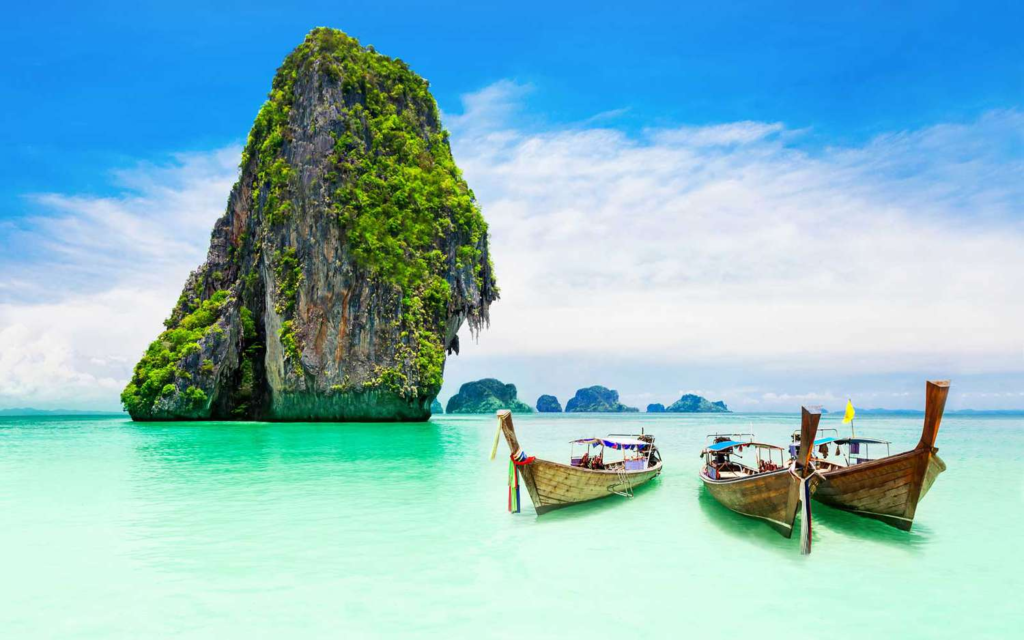
Phuket, Thailand’s largest island, is famous for its stunning beaches, vibrant nightlife, and luxurious resorts. Patong Beach is the island’s most popular beach, known for its lively atmosphere and water sports. For a more serene experience, visit Kata and Karon beaches, which offer beautiful stretches of sand and crystal-clear waters.
Phuket is also a hub for island-hopping tours, including trips to the picturesque Phi Phi Islands. The island’s cultural side can be explored at the Big Buddha and Wat Chalong, while the Old Town boasts well-preserved Sino-Portuguese architecture.
4. Ayutthaya
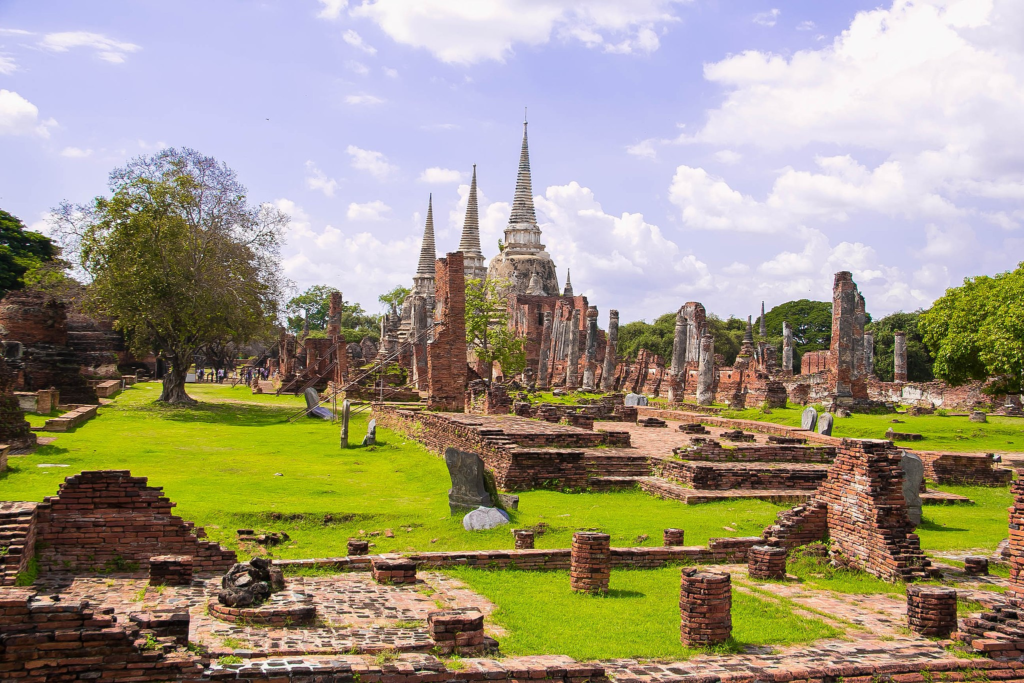
Ayutthaya, a UNESCO World Heritage Site, was once the capital of the Kingdom of Siam. Located just north of Bangkok, this ancient city is home to impressive ruins and temples that tell the story of its glorious past. Wat Mahathat, famous for the Buddha head entwined in tree roots, is a must-visit.
Wat Phra Si Sanphet, the grandest temple in Ayutthaya, and Wat Chaiwatthanaram, with its stunning architecture, are other highlights. Ayutthaya Historical Park, with its numerous ruins and monuments, is a testament to Thailand’s rich history and architectural prowess.
5. Krabi
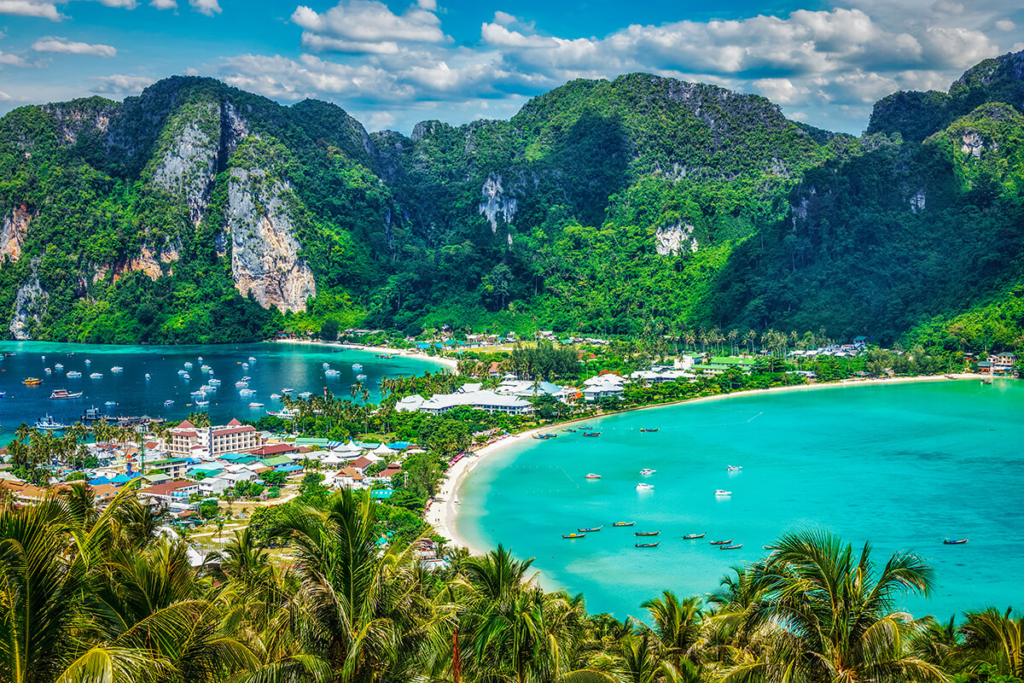
Krabi province is a paradise for nature lovers, offering dramatic limestone cliffs, pristine beaches, and clear turquoise waters. Railay Beach, accessible only by boat, is a haven for rock climbers and beach enthusiasts. The Phi Phi Islands, particularly Phi Phi Leh and Maya Bay, are world-famous for their stunning scenery and vibrant marine life.
Krabi is also home to Thung Teao Forest Natural Park, where you can visit the Emerald Pool and the Blue Pool, natural hot springs surrounded by lush forest. For a spiritual experience, climb the 1,237 steps to the Tiger Cave Temple and enjoy panoramic views.
6. Pattaya
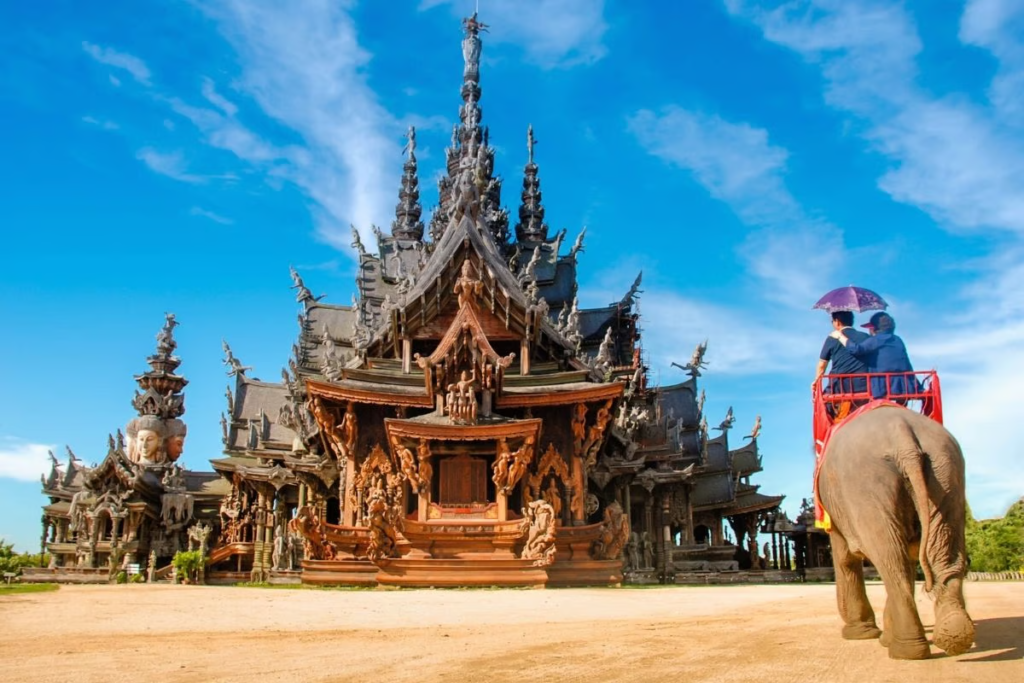
Pattaya, located on the eastern Gulf coast, is known for its vibrant nightlife, beautiful beaches, and family-friendly attractions. Walking Street is the heart of Pattaya’s nightlife, with numerous bars, clubs, and entertainment venues. For a more relaxed experience, visit Jomtien Beach, which offers a quieter atmosphere and water sports.
Pattaya is also home to the Sanctuary of Truth, an intricate wooden temple filled with carvings depicting traditional Buddhist and Hindu motifs. Families can enjoy attractions like the Pattaya Floating Market, Nong Nooch Tropical Botanical Garden, and Cartoon Network Amazone water park.
7. Chiang Rai
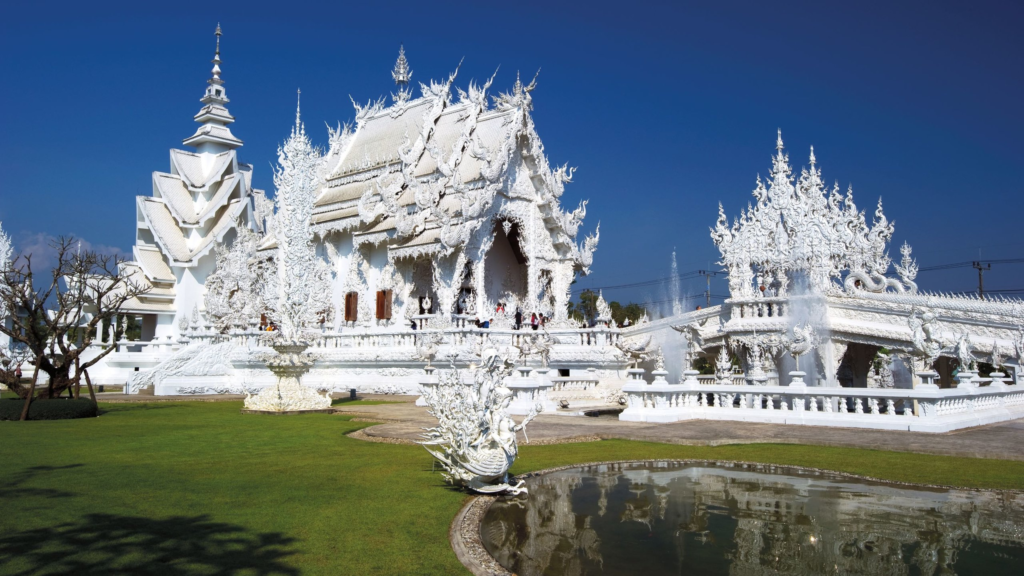
Chiang Rai, located in northern Thailand, is known for its unique temples and tranquil surroundings. The White Temple, or Wat Rong Khun, is a contemporary, unconventional temple that dazzles with its white facade and intricate details. The Blue Temple, or Wat Rong Suea Ten, is equally stunning with its vibrant blue color and exquisite artwork.
The Black House, or Baan Dam Museum, is a collection of dark, modern buildings filled with eclectic art. Chiang Rai also serves as a gateway to the Golden Triangle, where the borders of Thailand, Laos, and Myanmar meet.
8. Sukhothai

Sukhothai, the first capital of Thailand, is a UNESCO World Heritage Site known for its well-preserved ruins and historical significance. Sukhothai Historical Park, the main attraction, features numerous temples, stupas, and statues spread across a vast area.
Wat Mahathat, the largest and most impressive temple, is a highlight, along with Wat Si Chum, which houses a massive seated Buddha statue. Cycling through the park is a popular way to explore the ruins and soak in the ancient atmosphere. Sukhothai’s night market offers a taste of local cuisine and handmade crafts.
9. Koh Samui
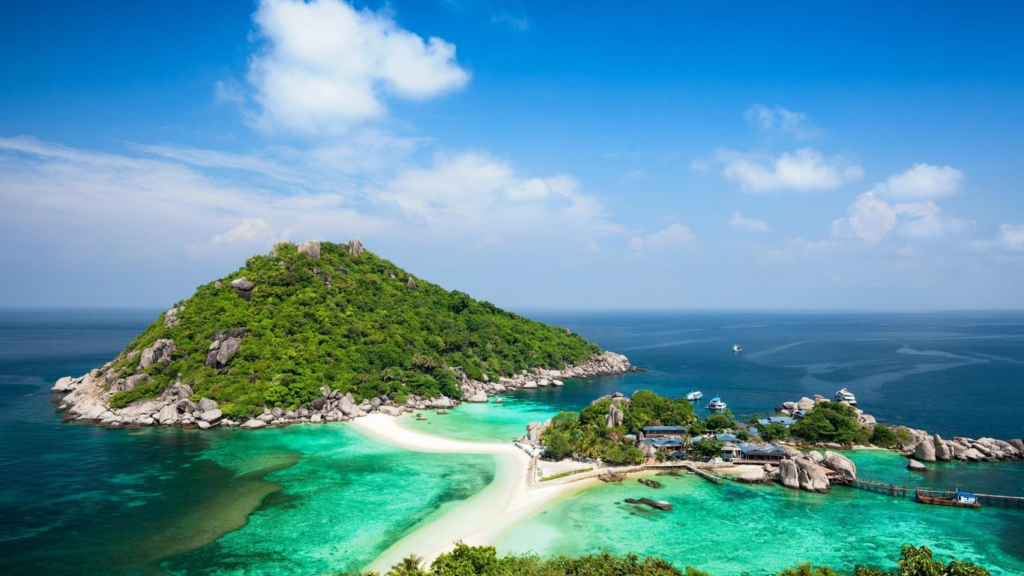
Koh Samui, one of Thailand’s most popular islands, is renowned for its palm-fringed beaches, luxury resorts, and lively nightlife. Chaweng Beach is the island’s main hub, offering a vibrant atmosphere and a wide range of accommodations, restaurants, and bars.
For a more laid-back experience, visit Lamai Beach or Bophut’s Fisherman’s Village, which features charming wooden houses and a weekly night market. Koh Samui is also home to the iconic Big Buddha, a 12-meter tall statue located on a small island connected by a causeway. Ang Thong National Marine Park, a stunning archipelago of 42 islands, is perfect for kayaking, snorkeling, and hiking.
10. Hua Hin
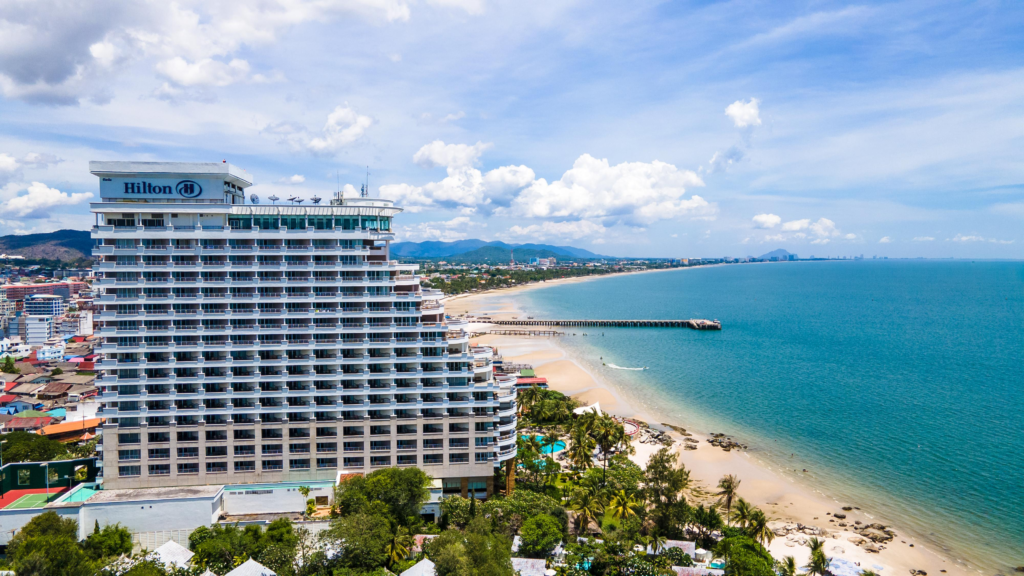
Hua Hin, a seaside resort town located on the Gulf of Thailand, is a favorite getaway for both locals and tourists. Known for its long sandy beaches, Hua Hin offers a relaxed atmosphere with a touch of elegance. The town’s night market is famous for its seafood and local crafts, while the nearby Cicada Market features handmade goods and live performances.
Hua Hin is also home to several golf courses, making it a popular destination for golf enthusiasts. For a unique experience, visit Plearnwan, a vintage village that recreates the atmosphere of a 1960s Thai market.
Thai Festivals and Celebrations
Thailand’s festivals are a reflection of its rich cultural and religious heritage. Songkran, the Thai New Year celebrated in April, is the most famous festival. It is marked by water fights, parades, and merit-making activities. Loy Krathong, celebrated in November, involves floating beautifully decorated baskets on rivers and lakes to honor the water spirits.
The Phi Ta Khon festival, held in the northeastern province of Loei, is a unique event where locals don colorful masks and costumes to celebrate the return of the spirits. The Yi Peng Lantern Festival in Chiang Mai, where thousands of lanterns are released into the sky, is a mesmerizing sight and a photographer’s dream.
Thai Cuisine: A Symphony of Flavors
Thai cuisine is renowned for its bold flavors and aromatic herbs. Each region in Thailand has its unique dishes and specialties. In the north, Khao Soi, a coconut curry noodle soup, is a must-try. The northeastern region, known as Isaan, is famous for its spicy and tangy dishes like Som Tum (green papaya salad) and Larb (spicy meat salad).
Central Thailand, where Bangkok is located, offers a variety of dishes such as Pad Thai, Tom Yum Goong, and Green Curry. In the south, the cuisine is influenced by Malay and Indian flavors, with dishes like Massaman Curry and Khao Mok Gai (Thai-style biryani).
Natural Wonders and Wildlife
Thailand’s natural beauty extends beyond its beaches and islands. The country is home to numerous national parks and wildlife sanctuaries. Khao Yai National Park, a UNESCO World Heritage Site, is known for its diverse flora and fauna, including elephants, gibbons, and hornbills. The park offers hiking trails, waterfalls, and opportunities for wildlife spotting.
Erawan National Park, located in western Thailand, is famous for its seven-tiered waterfall and emerald green ponds. Doi Inthanon National Park, home to Thailand’s highest peak, offers stunning views, cool climate, and unique flora and fauna. The Similan Islands and Surin Islands in the Andaman Sea are renowned for their marine life and are popular diving destinations.
Top Eight Most Famous Food of Thailand








Thai Art and Architecture
Thai art and architecture are deeply influenced by Buddhism and the country’s rich history. Traditional Thai architecture is characterized by intricate designs, steeply pitched roofs, and ornate decorations. Temples, or “wats,” are the most iconic examples of Thai architecture. Wat Arun, also known as the Temple of Dawn, is one of Bangkok’s most stunning landmarks with its towering spires and intricate porcelain decorations.
Thai traditional art includes murals, sculptures, and textiles. Thai silk, known for its quality and vibrant colors, is highly prized. Traditional Thai dance and music are integral parts of the cultural heritage, often performed during festivals and ceremonies.
Thailand’s Economy and Modern Development
Thailand has one of the largest economies in Southeast Asia, driven by diverse sectors such as tourism, agriculture, manufacturing, and services. Bangkok serves as the economic hub, hosting numerous multinational corporations and financial institutions. The country’s strategic location, skilled workforce, and infrastructure have made it an attractive destination for foreign investment.
Tourism plays a significant role in the economy, with millions of visitors flocking to Thailand each year. The country’s agricultural sector is known for its production of rice, rubber, and tropical fruits. Thailand is also a major exporter of electronics, automobiles, and textiles.
Sustainable Tourism and Eco-Friendly Initiatives
In recent years, Thailand has made efforts to promote sustainable tourism and protect its natural resources. Eco-friendly initiatives and community-based tourism projects have been introduced to ensure that tourism benefits local communities and minimizes environmental impact.
Projects like homestays, organic farming tours, and conservation programs allow visitors to experience Thailand’s natural beauty while supporting sustainable practices.
National parks and marine reserves have implemented measures to protect wildlife and habitats. Efforts to reduce plastic waste and promote recycling have been introduced in popular tourist destinations. Sustainable tourism not only preserves Thailand’s natural and cultural heritage but also provides meaningful experiences for travelers.
Hospitality and the Warmth of Thai People
Thailand is known as the “Land of Smiles” for a reason. The hospitality and warmth of the Thai people are legendary. Visitors to Thailand often remark on the friendliness and helpfulness of the locals. The concept of “sanuk,” meaning fun or enjoyment, is an integral part of Thai culture and is reflected in the country’s festivals, daily life, and interactions with visitors.
Thai hospitality extends to the country’s accommodation options, ranging from luxury resorts to budget-friendly hostels. Whether staying in a five-star hotel or a family-run guesthouse, visitors can expect a warm welcome and excellent service.
Conclusion
Thailand is a country of contrasts, where ancient traditions coexist with modern development, and bustling cities give way to serene landscapes. From the vibrant streets of Bangkok to the tranquil beaches of the south, from the cultural richness of the north to the historical treasures of Ayutthaya, Thailand offers a wealth of experiences for every traveler.
The country’s rich history, diverse culture, and natural beauty make it a destination like no other. Whether exploring ancient temples, savoring the flavors of Thai cuisine, or simply soaking in the warmth and hospitality of the Thai people, a journey to Thailand is an unforgettable adventure. The Land of Smiles welcomes you with open arms, ready to share its treasures and stories.

